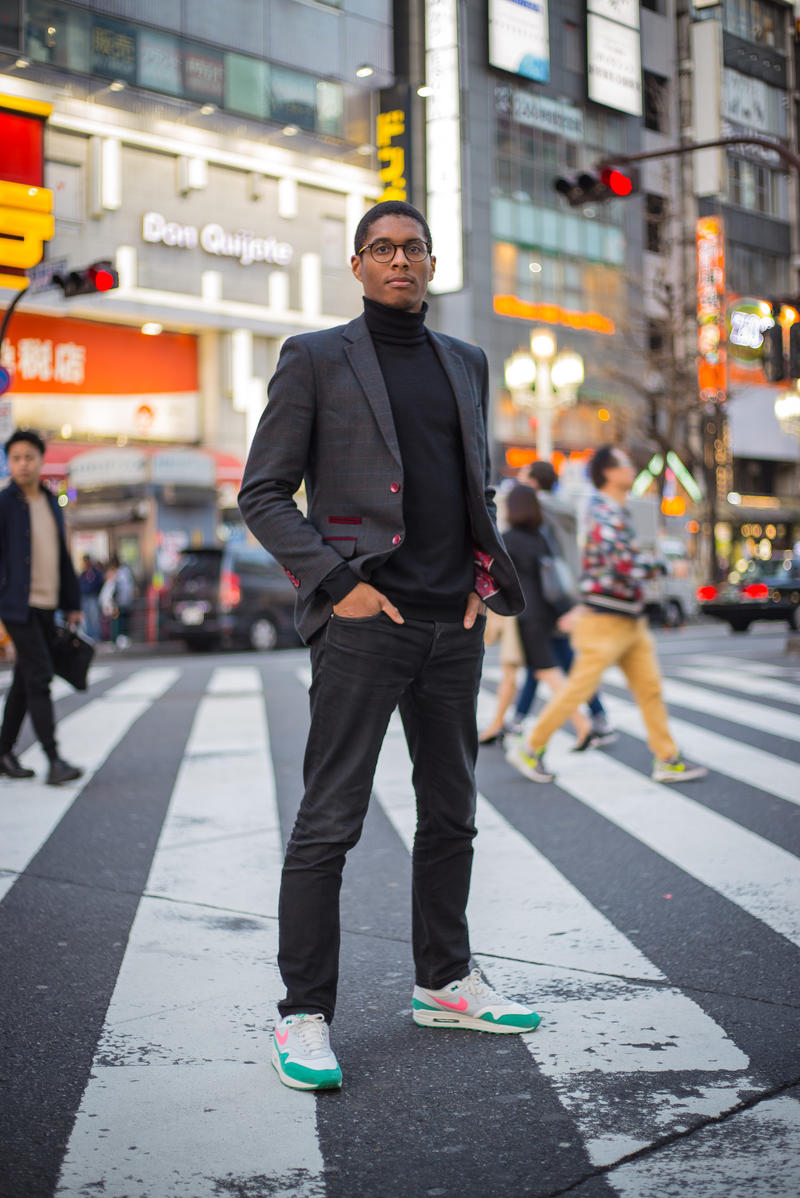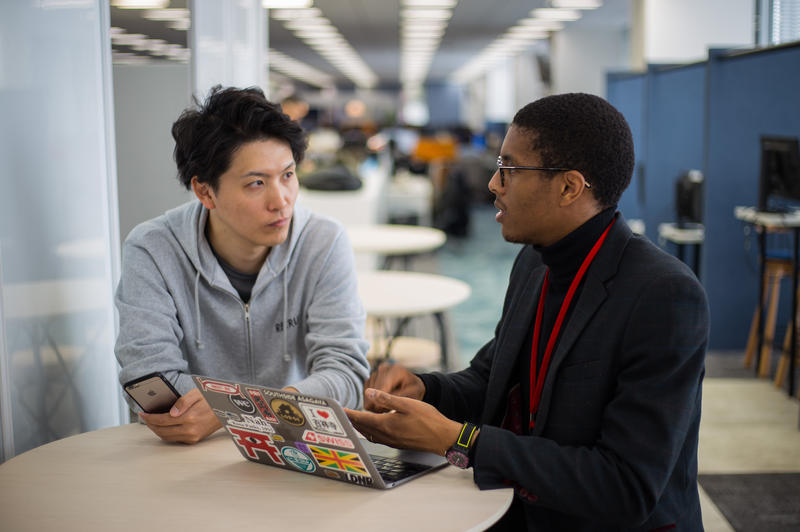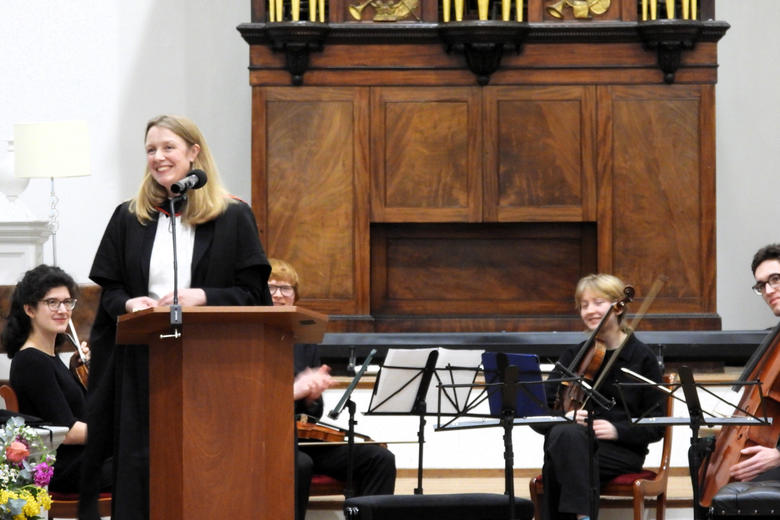ALUMNI STORIES: 'STAMP YOUR OWN IMAGE ON THE UNIVERSITY’

ALUMNI STORIES: 'STAMP YOUR OWN IMAGE ON THE UNIVERSITY’
Oxford DPhil candidate (Pembroke) and Co-President of the Oxford Alumni Club of Japan, Warren Stanislaus (St Antony’s, 2011) talks to us about working in Japan, increasing outreach and his studies
Published: 9 April 2019
Share this article
Why did you choose to study at Oxford?
I'd say there were two reasons. Firstly, I went to do my undergraduate degree at a university in Tokyo, and during that time, I really gained a passion for research. I was doing Japanese Studies, and when I was thinking about my future career, at that point research was on the cards for me. I wanted to go to an institution where they were really at the front lines and leading the way in terms of Japanese Studies research. That's when I learned about Oxford, and the Nissan Institute specifically. I also realised that one of the professors there was very much working in the field that I was interested in, and I think it's really important at the postgraduate level to find that professor or advisor who can guide you in the area of your research interest.
The second big reason was my professors at the time during my undergraduate degree in Tokyo – they really instilled a belief in me to apply to Oxford. I didn't see myself as Oxford material. But I was doing well at my university and getting good grades, and they recommended that I could apply to the University. That's when I really thought, 'Yeah, I can do this.' They helped me put together a competitive application and I think that was a really key moment for me as well, in terms of getting that confidence to apply. Even today, I think that's something that I try to do to help others as well, as a mentor and a volunteer, to try and help others to have that belief and apply to Oxford.
Can you elaborate on your feelings of not believing you could apply to Oxford?
I think the first thing is that during school I was a good student, and I got good grades; but I never really learned about what it would be to apply to Oxford or Cambridge. No-one around me suggested that that was something to aspire to. I had a different image of the University of Oxford and that image didn't necessarily align with my own personality.
But actually, after going there, that's something I've really tried to change the image of: to be someone at Oxford. It's really stamping my own image. Because Oxford doesn't necessarily belong to anyone; it's what you're contributing and the type of legacy that you can leave. That's something that I've really been able to change about myself and my image of the University as well.
You went to school in the UK and then came to Tokyo, how do you think those different types of learning have set you up to the person that you are now, to pursue your career, and to continue your studies?
In terms of the experience growing up in London and then doing a degree in Japan and how that influenced my life and career to date, I think the biggest way that that's changed me, really a key turning point was the transition going from high school in London and then going to Japan for the undergraduate degree. The reason why is because I didn't really think about it so much, surprisingly, it wasn't a strategy of, 'Okay. Is this going to take me in a certain career direction? And what's my CV going to look like?' It was really just about pursuing my passion at the time.
I think when you really put your mind to something and pursue your passion, you get engaged and interested in something, that's when you do your best work. That was very much the case when I was in Japan and gaining that passion for research, and being able to, not just learn about Japan from books, but also to get out into the wider world and use the city as my classroom. That's when I gained that passion for research, through that. That really set me up well for both applying to Oxford and just my career to date, where I'm continuing to go for what I'm passionate about.

Tell us a little bit about your career.
In terms of my plan for my career while I was at Oxford doing my Master's degree, going back to Japan was always on my agenda. So throughout the two years I was looking through different websites and trying to learn about the job hunting process in Japan. Fortunately, there were lots of Japanese companies that have started to approach Oxford to hire students. My first job was in Tokyo – the British Council: I was a projects officer there within the education department. My main role was to promote British education or the UK as a study abroad destination among Japanese students. I went to Japanese universities on a weekly basis and give hour-long presentations to share the benefits of a British education. The other part of my job, which was really influential for me was the higher education promotion and forging ties between British and Japanese universities, so that they can learn best practice from each other about bringing in students from overseas, or just research in general.
After a year, I joined the Asia Pacific Initiative, which is a think tank in Tokyo. That was another turning point in my career. Within this think tank, which focussed on security and foreign policy, and centred on Japan and Japan's role in the world, I had two key roles. The first one was as a research assistant to the chairman, Dr Yoichi Funabashi, who's a leading public intellectual in Japan. I had the opportunity to ghost write his articles and speeches that he would be giving at forums such as the World Economic Forum or going to universities overseas to talk about Japan's place in the world. I was really on the front lines of agenda setting and the way Japan was depicting itself. My other role was as a project manager So it wasn't just about agenda setting through articles, it was also through books and then events around these books, where we could gather different experts and politicians and business leaders to talk about the content that we were producing. In the late twentieth century and the early twenty-first century, there's been lots of talk about Japan's decline in the world. Whether that's in terms of its economic decline and the lack of competitiveness of its companies or the ageing population and all these challenges. But we were trying to flip that on its head and say, 'Okay. What can Japan now offer to the world?' In fact, Japan is a problem pioneer, because it's at the front line of experiencing these problems and also it can be at the front line of solving these problems; that are now becoming global problems as well. Ageing society is spreading to other developed countries, and so we were really exploring these issues through this research, which, it wasn't just an individual research project. At the heart of this research is that collaborative approach. So we gathered together a host of experts from the US, UK and Japan, including business leaders, politicians and academics; all to share their thoughts on why Japan matters. And at the end of it we produced two bilingual books. So it's really driving the narrative and setting the agenda about Japan on a global sphere.
You’re now the Co-President of the Oxford Alumni Club of Japan, can you tell us a little bit more about that?
At the moment we are focussing on two key areas. One of them is building this network within Japan and gathering recent graduates who are looking to connect, and meet, with other Oxford alumni. We organise social events in Tokyo to help people re-live their experience and what it was like in the University. Beyond the social dimension of the group, I think it's really important to add value to our alumni members, and try to connect the group to the University and the future alumni and current students. One way that we've been putting a lot of effort into doing that is through internships. I think there has been this merging or convergence of demands and interests from different stakeholders right at the same time. A perfect storm, if you will. One key trend is that you have Japanese companies that are starting to look overseas and looking outwards in terms of their HR strategy. So they're eager to attract international students, so whether that's Japanese students who have studied overseas or students who are learning the Japanese language, or even students with some really high computer science and technical skills. The other key trend that I noticed is that, within the University of Oxford itself, internships have become really important. They're trying to expand the number of internships and make that a major part of the university experience. In addition there is also an increasing demand amongst Oxford students to go to Japan. So all of these different trends were meeting, and I thought, 'Okay. Perhaps internships can be the key link that provides a solution to try and meet all these different demands.'
The first thing that I tried to solve in that area was improving the supply of Japanese companies offering internships to Oxford students. I've been able to build on a lot of the skills that I've gained throughout my career to date; whether that's the Japanese language skills, or academia and industry collaboration. I've reached out to several Japanese companies and the project has been really successful so far: over the past year, we've been able to create about thirty internship positions, fully paid, fully covered flights, accommodation, everything, for Oxford students to go to Tokyo for the summer months for internships.

Within academia, do you think that there’s a responsibility for academics to take a more modern and diverse approach?
Yes, I think you need a diversity of people within academia. There's always going to be people who are very much focussed on the research side, within the archives, and that's where they thrive. Then there's going to be others who are good at bringing in funding from different bodies and working collaboratively outside of the university. I think that's what's needed – that diversity of images and role models of what an academic can be. I guess personally, growing up, I perhaps didn't see that diversity of what it means to be an academic; so, with that lack of role model, I'm trying to be my own role model in a sense, and carve out my own path to create a new role model or a new type of academic, that is engaged within the university, but also is able to bring in different stakeholders too. I think one reason why I'm so passionate about this is because growing up I didn't have that confidence to become an academic, because there was only one image of what an academic is. Then I realised with age that I could create my own image of what it can be and my own space within the existing structures
What was it like, transitioning to Oxford?
I think the first time and the second time was really different. The first time I got to Oxford, and I think this is perhaps very much the case for a lot of people who go to Oxford for the first time, whether undergraduate or postgraduate, but in their own spaces or their own universities or schools, they were often at the top end or the top five or one percent of the students. But when they get into Oxford they have that imposter syndrome and feeling inadequate in comparison to all the other excellent people there who have three or four different extracurricular activities and can speak different languages and everything like that. I think when I first arrived to Oxford, I came in very confident; I'd graduated from a university in Japan, could speak Japanese. But then you start to meet other people who've done the same thing and more. Then you go through that experience of, 'Oh, are my achievements really that significant or not?' But I think the key is just, and this is the advice I would give potentially to future students is just not to compare yourself to other people. If you try and compare yourself to other people, or even try to be like other people, then there's something that you won't be able to contribute and bring and you won't be able to impact people in the way that only you can. I think that's something that I've really gained a conviction of now I'm going back to Oxford the second time for my DPhil at Pembroke College. Going back the second time for my DPhil I had more confidence in the fact that you don't need to try and be like other people, and don't compare yourself to other people. Try and stamp your own image on the University.
Are there any favourite places that you have in Oxford?
When I first came to Oxford it felt nostalgic. It felt like the Britain of children's books that I read growing up, but hadn't really visited when I was growing up in London. The architecture was extremely beautiful and the balance between city life and walking ten minutes outside of the city to Port Meadow – you have the beautiful countryside atmosphere as well, that you can connect to.
The next thing – Oxford is really important to me on a personal level as well, not just because of the academic side, but actually had my wedding ceremony there. I had the wedding ceremony in Exeter College in the beautiful chapel with the stained glass windows. We then had the reception in Port Meadow, and specifically The Perch pub there.
Another memorable moment was when I was graduating. I was able to bring, I guess, my closest family, so my parents and my grandma and we went to the Sheldonian theatre for the graduation ceremony. It was a time I could share the Oxford experience with my family. There was a really amazing moment when the Vice-Chancellor at the time said that we should all turn around, face our family and then applaud them. I think that moment really hit me, thinking about all of the support my family and friends beyond that had given me up until then. That was a really nice moment that I could share with my family and make them feel proud about me going there as well.
Tell us the most rewarding experience of studying at Oxford.
I think the most rewarding experience for me studying at Oxford was the exams, surprisingly. At the start of the year, you hear about the exams and it feels very daunting; that you're going to have to be sat in an exam hall, three hours each time, answering three different questions and having to write several pages for the whole time, throughout the week. That was something that I was anxious about throughout the year. Being able to get through that was an experience which has served me well. I think if you can get through Oxford exams, you can get through most things in life. A memorable moment was through one of my later exams, after having written so much, I had to put a tissue around one of my fingers, to be able to keep on writing. The most rewarding part of it was not just the exam taking itself, but was the preparation for that. The individual preparation in doing the research and connecting with your tutors to find out if you're going in the right direction; but also being able to collaborate with other students, because they are all in the same position. It really is about that teamwork and helping each other through that moment. I think that really prepares you well for the future as well because you're going to be having to work in a team.
How do you think Oxford's changed you?
I think the first time that I joined Oxford for my Master's degree, it was really tough. There were moments when you thought, 'Oh, can I graduate? Should I quit? Should I not?' Whether it was through those low moments of really questioning your identity and your capabilities, or on the other hand whether it's through the high moments of getting good feedback from your advisors on a report, or getting good grades in the exam, I think the big thing that I really learned through that experience and the way Oxford changed me is to be confident in yourself and what you can bring to the table. That was my biggest take away.
Now, going back to Oxford for the second time for my DPhil, although you will always struggle with those moments where you question yourself or other moments when you feel on top of the world, I think what it has given me is feeling of being rooted in myself. So that whatever I'm doing, I'm always staying true to myself. I think that's really the way that I can make an impact, both within the University and beyond that in different spheres and places that I'm engaged in as well.
Read more about the Oxford Alumni Club of Japan's internship programme.















